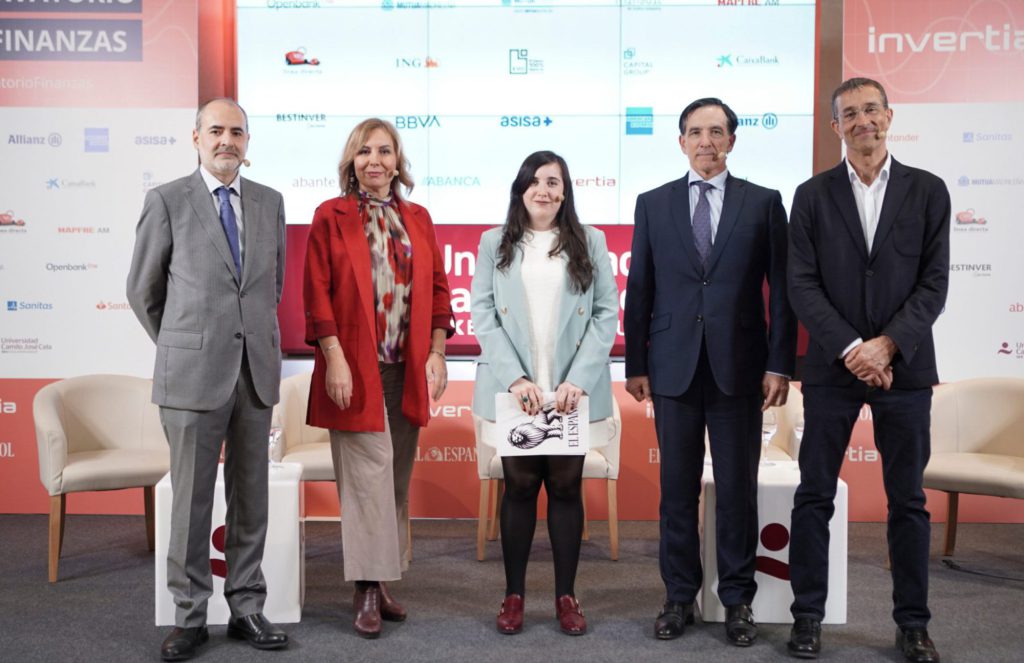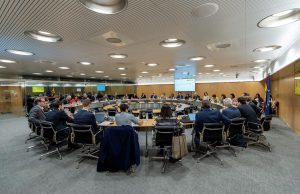These issues 'do not only affect the financial sector, they are structural transformations of the economic system'.
Artificial intelligence, sustainability and regulation. These are the main challenges facing the financial sector, according to the diagnosis made by representatives from different areas of the sector during the 4th Finance Observatory organised by EL ESPAÑOL - Invertia.
The round table on the future of the financial sector featured Monica Melle, member of the Board of the Audit Office of the Autonomous Community of Madrid; Antonio Romero, Corporate Director of Association Services and Resources at CECA; Angel Martínez-Aldama, Chairman of Inverso, and Arturo González Mac Dowell, Chairman of the Spanish FinTech and InsurTech Association.
According to Melle, the technological challenge 'transforms everything'. The board member of the Audit Office of the Autonomous Community of Madrid has put the spotlight on cybersecurity, a challenge that companies in the sector have to address in order to 'provide security to customers and users' with regard to the services they provide. This is 'a change in the value chain brought about by technology'.
In Melle's opinion, 'fintech companies have changed everything'. An issue that 'entails new risks that will need to be regulated'. She singled out artificial intelligence as a 'major challenge for the sector'.
In relation to artificial intelligence, Melle stressed the importance of financing for companies developing this technology, 'as we do not want to generate a new bubble'.
From AI to sustainability
Another challenge for the financial sector, in addition to digitalisation and artificial intelligence, is sustainability. 'Climate change and all the environmental risks are there', noted Melle.
According to Antonio Romero, the challenges brought about by 'digitalisation and sustainability do not only affect the financial sector, they are structural transformations of the economic system'. 'The banking sector must figure out what its role is in these transformations', he added.
According to Romero, digitalisation entails a 'transversal transformation of the financial system'. With regard to sustainability, CECA's Corporate Director of Association Services and Resources emphasised 'the transformations required by the financial system itself'.
In his opinion, the task of the financial sector is to 'support the productive sector in decarbonising its processes and evolving towards an economy that is less intensive in polluting energies'. He believes that 'the sector is in an ideal position to do so'.
Regulation
In his remarks, Torres also stressed the importance of having a regulatory framework 'that provides security' in order to be able to 'adequately develop or address these challenges'. He also warned of the importance of 'not leaving any group behind'.
Martínez-Aldama added that 'it is essential that this regulation be consistent and provide the financial system with the capacity to carry out its work'. In his view, the key challenge for the sector 'is to finance the economy'.
With the financial capacity of the public sector constrained as a result of its need to reduce the deficit and debt, the Chairman of Inverco emphasised the importance of public-private collaboration. 'We need €300 billion per year to change the production method of our companies', he stressed.
Arturo González Mac Dowell is not as concerned about 'the issue of sustainability'. In his view, the financial sector in general, excluding bitcoin mining, is probably one of the sectors with the least negative impact on the environment.
As such, he stressed that the main challenges facing the sector are, in reverse order, 'the changing and increasingly polarised user', technology and regulation.
González has argued that it is precisely the 'unstoppable regulatory change' that should be stopped. 'They have done this in the United Kingdom as an exercise in retrospection', he said.
'There are many mouths to feed in Brussels that continue to generate regulation. On Mondays, those on the right say that regulation must move in one direction and on Tuesdays those on the left say it must go in the other', he stressed.













